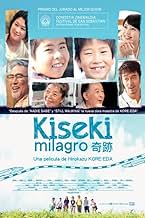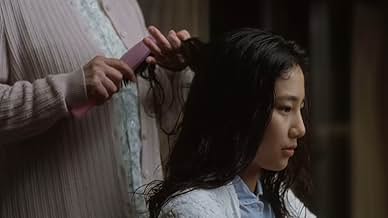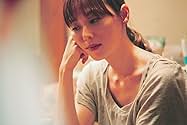NOTE IMDb
7,3/10
8,3 k
MA NOTE
Koichi, 12 ans, qui est séparé de son frère, Ryunosuke, à la suite du divorce de ses parents entend une rumeur selon laquelle les nouveaux trains grande vitesse accordent un voeu miraculeux ... Tout lireKoichi, 12 ans, qui est séparé de son frère, Ryunosuke, à la suite du divorce de ses parents entend une rumeur selon laquelle les nouveaux trains grande vitesse accordent un voeu miraculeux lorsqu'ils se croisent à toute allure.Koichi, 12 ans, qui est séparé de son frère, Ryunosuke, à la suite du divorce de ses parents entend une rumeur selon laquelle les nouveaux trains grande vitesse accordent un voeu miraculeux lorsqu'ils se croisent à toute allure.
- Réalisation
- Scénario
- Casting principal
- Récompenses
- 5 victoires et 9 nominations au total
Kôki Maeda
- Koichi
- (as Koki Maeda)
Ôshirô Maeda
- Ryunosuke
- (as Oshiro Maeda)
Nene Ôtsuka
- Nozomi (Mother)
- (as Nene Ohtsuka)
Avis à la une
Pre-teen brothers Ryunosuke and Koichi (played by real-life brothers Ohshirô and Koki Maeda) are forced to live apart when their separated parents end up residing in opposite ends of Kyushu. Ryunosuke broods on this, while Koichi seems more at ease with the arrangements. Together, the brothers hatch a plan to meet at the point where the new shinkansen trains pass each other, after hearing an urban legend that the vortex created by the speed of the trains has the power to grant wishes. Meanwhile, granddad tries out a new sponge cake recipe, a friend of Koichi's has acting ambitions, and Dad is writing a new song.
The usual Kore-eda themes of fractured families and kids finding magic in a flawed universe are present, but by the director's own standards this is a much lighter, almost sugar-coated engagement with those themes. There is the signature naturalistic, engrossing performances from the child actors, with Ohshirô as Ryunosuke especially impressive in his conflicted, caring attempts to be re-united with his brother. Koki is more of a one-note outing, required to be relentlessly upbeat, which he does superbly. The scene where he moves his mother to tears on the phone plays on this astutely. Forcing two young brothers to live apart for their own selfish ends could be represented in darker tones, even as abuse, but Kore-eda keeps it all light and humorous, through the simple trope of having the children be sensible and down-to-earth, and the adults, especially the bickering parents, petty and immature. The sub-plots, involving sponge cake and acting ambitions, are so removed from the main story strand that they give the film an episodic, slightly meandering feel when they pop up. Ultimately they are distracting, making the story busier than it needs to be. They also stretch the running time to over two hours. While some will delight in spending time with such engaging children, the film felt flabby to me after the 90-minute mark. The ending, while admirably avoiding sentimentality, takes too long to come around.
Such is Kore-eda's stature that a host of A-listers pack the minor roles giving them more gravitas than normal. Jô Odagiri as the musician father, Kirin Kiki as the grandmother, and Hiroshi Abe as a disciplinarian teacher ply their day-shifts admirably.
There is a lot to enjoy in I Wish, but lacking the damning social critique of Nobody Knows, and the acerbic scalpel on family life of Still Walking, this is Kore-eda choosing to crowd please rather than stretch himself.
The usual Kore-eda themes of fractured families and kids finding magic in a flawed universe are present, but by the director's own standards this is a much lighter, almost sugar-coated engagement with those themes. There is the signature naturalistic, engrossing performances from the child actors, with Ohshirô as Ryunosuke especially impressive in his conflicted, caring attempts to be re-united with his brother. Koki is more of a one-note outing, required to be relentlessly upbeat, which he does superbly. The scene where he moves his mother to tears on the phone plays on this astutely. Forcing two young brothers to live apart for their own selfish ends could be represented in darker tones, even as abuse, but Kore-eda keeps it all light and humorous, through the simple trope of having the children be sensible and down-to-earth, and the adults, especially the bickering parents, petty and immature. The sub-plots, involving sponge cake and acting ambitions, are so removed from the main story strand that they give the film an episodic, slightly meandering feel when they pop up. Ultimately they are distracting, making the story busier than it needs to be. They also stretch the running time to over two hours. While some will delight in spending time with such engaging children, the film felt flabby to me after the 90-minute mark. The ending, while admirably avoiding sentimentality, takes too long to come around.
Such is Kore-eda's stature that a host of A-listers pack the minor roles giving them more gravitas than normal. Jô Odagiri as the musician father, Kirin Kiki as the grandmother, and Hiroshi Abe as a disciplinarian teacher ply their day-shifts admirably.
There is a lot to enjoy in I Wish, but lacking the damning social critique of Nobody Knows, and the acerbic scalpel on family life of Still Walking, this is Kore-eda choosing to crowd please rather than stretch himself.
This is the story of two young Japanese brothers who live apart following the break-up of their parents' relationship. The older boy dreams of his family reuniting and prays for a miraculous intervention in the form of a volcanic eruption, hoping this might lead to his evacuation from his grandparents' region and a return home. Then, when he discovers that the passing of the speeding Bullet trains, approaching from opposite directions, creates a 'cosmic' moment during which wishes are granted, he sets out with a few friends to meet his brother at the meeting point on the railway line. There they make their wishes - with varying results.
The two brothers are forced to deal with the consequences of their parents' choices, ones they have had no part in making. Their belief, to varying degrees, in the power of 'faith' (believing that wishes can come true) then leads them to have to face the consequences of their own choices. Given their youthful immaturity, there is real poignancy in witnessing their confrontation with some harsh realities.
The movie features brilliant performances from the young actors and an excellent supporting cast of adults. There is also gorgeous and evocative cinematography, scenes of the Japanese countryside and its urban impositions, not least the Bullet line itself elevated on its concrete trackbed.
It takes some time, too long perhaps, for the story to gain momentum. But once the youngsters embark on their journey to meet the trains, the story moves at a brisker, more engaging pace. The climax (yes there is a climax, contrary to the view of another reviewer) brings moments of intense beauty and sharp sadness, regret for the loss of childish innocence of as well as optimism in the hope for a better future.
So this is a slow-burner, but persistence brings rewards. Recommended.
(Viewed at The Cornerhouse, Manchester, UK 21.02.13)
The two brothers are forced to deal with the consequences of their parents' choices, ones they have had no part in making. Their belief, to varying degrees, in the power of 'faith' (believing that wishes can come true) then leads them to have to face the consequences of their own choices. Given their youthful immaturity, there is real poignancy in witnessing their confrontation with some harsh realities.
The movie features brilliant performances from the young actors and an excellent supporting cast of adults. There is also gorgeous and evocative cinematography, scenes of the Japanese countryside and its urban impositions, not least the Bullet line itself elevated on its concrete trackbed.
It takes some time, too long perhaps, for the story to gain momentum. But once the youngsters embark on their journey to meet the trains, the story moves at a brisker, more engaging pace. The climax (yes there is a climax, contrary to the view of another reviewer) brings moments of intense beauty and sharp sadness, regret for the loss of childish innocence of as well as optimism in the hope for a better future.
So this is a slow-burner, but persistence brings rewards. Recommended.
(Viewed at The Cornerhouse, Manchester, UK 21.02.13)
In Kagoshima, the boy Koichi (Koki Maeda) lives with his mother Nozomi (Nene Ohtsuka) in the house of his grandparents. Koichi misses his younger brother Ryunosuke (Ohshirô Maeda) and his father Kenji (Jô Odagiri), who live in Fokuoko, and he dreams on his family coming together again. One day, Koichi overhears that the energy released by two bullet trains passing by each other would grant wishes and he invites his two best friends, Tasuku (Ryôga Hayashi) and Makoto (Seinosuke Nagayoshi), to travel to the point of intersection of the two trains. Koichi also tells his plan to Ryunosuke that invites his three best friends to join him. Soon the seven children arrive to the meeting point in the journey of discoveries.
"Kiseki" is a simple and sensitive tale of loss of innocence of children that need to face reality instead of immature and naive dreams. The come of age of Koichi that accepts the divorce of his parents and of Megumi (Kyara Uchida) that decides to move to Tokyo to become an actress and Makoto that decides to bury his dog are clearly are depicted in the story. Ryunosuke is still a child and believes that his wish is the responsible for the chance his father and his friends will have in their career of musicians.
The direction of Hirokazu Koreeda and the performances are top-notch and the movie shows landscapes of the countryside of Japan that are unusual in Japanese features. My vote is eight.
Title (Brazil): "O Que Eu Mais Desejo" ("What I Desire the Most")
"Kiseki" is a simple and sensitive tale of loss of innocence of children that need to face reality instead of immature and naive dreams. The come of age of Koichi that accepts the divorce of his parents and of Megumi (Kyara Uchida) that decides to move to Tokyo to become an actress and Makoto that decides to bury his dog are clearly are depicted in the story. Ryunosuke is still a child and believes that his wish is the responsible for the chance his father and his friends will have in their career of musicians.
The direction of Hirokazu Koreeda and the performances are top-notch and the movie shows landscapes of the countryside of Japan that are unusual in Japanese features. My vote is eight.
Title (Brazil): "O Que Eu Mais Desejo" ("What I Desire the Most")
I've been impressed with Koreeda's work in the past. "Maborosi" and "After Life" are two excellent, deeply philosophical and moving films. Maybe based on those I had unrealistically high expectations (further inflated by the DVD box boasting a dozen rave reviews & awards), but "I Wish" failed to deliver.
One hour into this 2-hour movie I had to shut it off. Since I didn't watch the whole thing I can't fairly rate it, but I wanted to share my (unpleasant) experience because I wish someone had warned me the same way. This was the first time in my life I've ever shut off a movie from sheer boredom. No, boredom isn't the word. It was more a feeling of total disconnection. The scenes, perhaps attempting to recreate the disconnected, ADD-type thought process of little kids, were so unrelated and random that I became irritated.
Like my title suggests, if you want to see a truly magical film about youth, innocence and the not-so-innocent, hunt down a film called "Kikujiro" (1999). More about that later. First let's talk about "I Wish".
Here is a breakdown of the first hour. Each scene lasts 2-5 minutes. At any time if you become bored, skip to the last paragraph of my review.
Scene 1) a boy grabs a washcloth and cleans his desk. Scene 2) The boy's mother is talking about meaningless things while the grandmother makes random gestures in the air, saying "I'm the wind. I'm a ghost. Etc..." Scene 3) The boys walk to school and complain about the hill. Scene 4) Kids are scolded by a teacher for not doing their homework properly. Scene 5) Kids are in the hall complaining about the teacher. Scene 6) Back to the mother and grandparents talking about vegetable gardens. Scene 7) Jump to some other kids at a swimming pool. Scene 8) The boy stares blankly at his homework assignment. Scene 9) A bunch of old men talk about baking a cake for the festival. Scene 10) The boys are back in school ogling the librarian's legs. Scene 11) The boy's father wakes up, strums a guitar and goes back to sleep. Scene 12) The kids gather and talk about acting.
While I hesitate to call the movie "bad" because I didn't watch it all the way through, I can definitely conclude that the first hour didn't provide enough substance to convince me to keep watching. And trust me, I like slow movies (2001, Werckmeister Harmonies, Hitchcock's Rope). Instead of watching "I Wish", I HIGHLY recommend a Japanese film called "Kikujiro" which this movie seemed to be imitating. However, even though it is slow paced, "Kikujiro" wastes no scenes. They all relate to each other, build upon each other and eventually lead you to a powerful message by the time the film ends. The music in "Kikujiro" (composed by the Japanese master Joe Hisaishi) is also leagues above the mediocre soundtrack of "I Wish", another turnoff. Maybe one day I'll go back & finish the last hour of this film and revise this review if I feel differently. But all the same, I'd rather spend my time watching something else.
One hour into this 2-hour movie I had to shut it off. Since I didn't watch the whole thing I can't fairly rate it, but I wanted to share my (unpleasant) experience because I wish someone had warned me the same way. This was the first time in my life I've ever shut off a movie from sheer boredom. No, boredom isn't the word. It was more a feeling of total disconnection. The scenes, perhaps attempting to recreate the disconnected, ADD-type thought process of little kids, were so unrelated and random that I became irritated.
Like my title suggests, if you want to see a truly magical film about youth, innocence and the not-so-innocent, hunt down a film called "Kikujiro" (1999). More about that later. First let's talk about "I Wish".
Here is a breakdown of the first hour. Each scene lasts 2-5 minutes. At any time if you become bored, skip to the last paragraph of my review.
Scene 1) a boy grabs a washcloth and cleans his desk. Scene 2) The boy's mother is talking about meaningless things while the grandmother makes random gestures in the air, saying "I'm the wind. I'm a ghost. Etc..." Scene 3) The boys walk to school and complain about the hill. Scene 4) Kids are scolded by a teacher for not doing their homework properly. Scene 5) Kids are in the hall complaining about the teacher. Scene 6) Back to the mother and grandparents talking about vegetable gardens. Scene 7) Jump to some other kids at a swimming pool. Scene 8) The boy stares blankly at his homework assignment. Scene 9) A bunch of old men talk about baking a cake for the festival. Scene 10) The boys are back in school ogling the librarian's legs. Scene 11) The boy's father wakes up, strums a guitar and goes back to sleep. Scene 12) The kids gather and talk about acting.
While I hesitate to call the movie "bad" because I didn't watch it all the way through, I can definitely conclude that the first hour didn't provide enough substance to convince me to keep watching. And trust me, I like slow movies (2001, Werckmeister Harmonies, Hitchcock's Rope). Instead of watching "I Wish", I HIGHLY recommend a Japanese film called "Kikujiro" which this movie seemed to be imitating. However, even though it is slow paced, "Kikujiro" wastes no scenes. They all relate to each other, build upon each other and eventually lead you to a powerful message by the time the film ends. The music in "Kikujiro" (composed by the Japanese master Joe Hisaishi) is also leagues above the mediocre soundtrack of "I Wish", another turnoff. Maybe one day I'll go back & finish the last hour of this film and revise this review if I feel differently. But all the same, I'd rather spend my time watching something else.
As a result of their parent's separation, 12-year-old Koichi (Koki Maeda) lives in Kagoshima with his mother (Nene Ohtsuka) and grandparents (Kirin Kiki and Isao Hashizume) while his younger brother Ryunosuke (Oshiro Maeda) lives with his intermittently employed musician father (Jo Adigiri) in Fukuoka. Both talk to each other daily on their cell phone but have not seen each other in six months. Acclaimed Japanese director Hirokazu Koreeda's I Wish is a comedy/drama about the consequences of a split family and of the children's longing to reunite them. In contrast to Nobody Knows, an earlier Koreeda film about children, I Wish will not break your heart.
The brothers (brothers in real life as well) are very different in personality but both seem happy and well adjusted in spite of the difficult circumstances of their life. Ryu is fun loving and his toothless smile will warm your heart. Koichi is more serious and thoughtful but very engaging. He becomes elated when he hears that a bullet train is coming that will connect his city to his brother's. Even more exciting are the rumors that are floating around that when two trains pass each other in opposite directions, your wishes will come true out of the energy the trains create. Koichi's wish is for the nearby volcano to explode so that his family will have to move, and he will be reunited with his brother.
The plan is to meet his brother half-way and do some serious wishing. The fun starts when they have to find creative ways to raise the money. There's also the pesky part about Koichi and his two friends leaving school in the middle of the day. For this he recruits his grandfather to provide an excuse to the school authorities and includes the school librarian who once had a similar experience of wanting to escape from school to attend a concert.
The group of friends of both brothers adds a lot to the film as well. Tasuku (Ryoga Hayashi) wants to marry his teacher, a bit of magic realism there. Makoto (Seinosuke Nagayoshi) wants his dog to come back to life. Megumi (Kyara Uchida), much to her mother's indifference, wants very much to go to Tokyo and become an actress. Kanna (Kanna Hashimoto) wants to be a better painter, and Rento (Rento Isobe) wants to be a faster runner. While the focus of the film are the wishes of the group of children and their trip to the trains' midpoint, the film also provides a rounded portrait of all of its characters without syrup or other sweeteners, though it certainly views children through a somewhat rose-colored lens.
I Wish is a charming and lighthearted film, though its over two hour's length can makes the goings-on a bit tedious. Although the children arrive at the point of realizing that accepting what is can produce happiness, the growth in reaching that point is what the film is about. Ultimately, however, though hoping, wishing, and yearning are all part of childhood, some adults come to realize that, a step beyond wishing and hoping and praying for something to happen, is our ability to create, to make things happen. Unfortunately, most people have not gotten past the hoping stage.
The brothers (brothers in real life as well) are very different in personality but both seem happy and well adjusted in spite of the difficult circumstances of their life. Ryu is fun loving and his toothless smile will warm your heart. Koichi is more serious and thoughtful but very engaging. He becomes elated when he hears that a bullet train is coming that will connect his city to his brother's. Even more exciting are the rumors that are floating around that when two trains pass each other in opposite directions, your wishes will come true out of the energy the trains create. Koichi's wish is for the nearby volcano to explode so that his family will have to move, and he will be reunited with his brother.
The plan is to meet his brother half-way and do some serious wishing. The fun starts when they have to find creative ways to raise the money. There's also the pesky part about Koichi and his two friends leaving school in the middle of the day. For this he recruits his grandfather to provide an excuse to the school authorities and includes the school librarian who once had a similar experience of wanting to escape from school to attend a concert.
The group of friends of both brothers adds a lot to the film as well. Tasuku (Ryoga Hayashi) wants to marry his teacher, a bit of magic realism there. Makoto (Seinosuke Nagayoshi) wants his dog to come back to life. Megumi (Kyara Uchida), much to her mother's indifference, wants very much to go to Tokyo and become an actress. Kanna (Kanna Hashimoto) wants to be a better painter, and Rento (Rento Isobe) wants to be a faster runner. While the focus of the film are the wishes of the group of children and their trip to the trains' midpoint, the film also provides a rounded portrait of all of its characters without syrup or other sweeteners, though it certainly views children through a somewhat rose-colored lens.
I Wish is a charming and lighthearted film, though its over two hour's length can makes the goings-on a bit tedious. Although the children arrive at the point of realizing that accepting what is can produce happiness, the growth in reaching that point is what the film is about. Ultimately, however, though hoping, wishing, and yearning are all part of childhood, some adults come to realize that, a step beyond wishing and hoping and praying for something to happen, is our ability to create, to make things happen. Unfortunately, most people have not gotten past the hoping stage.
Le saviez-vous
- AnecdotesShinkansen wanted to make a movie to promote their bullettrains. They approached Koreeda, an avid trainlover. He came up with this movie.
- ConnexionsFeatured in A Story of Children and Film (2013)
- Bandes originalesKAGOSHIMA OHARA BUSHI
Written by Quruli
Performed by Quruli
Meilleurs choix
Connectez-vous pour évaluer et suivre la liste de favoris afin de recevoir des recommandations personnalisées
- How long is I Wish?Alimenté par Alexa
Détails
- Date de sortie
- Pays d’origine
- Sites officiels
- Langue
- Aussi connu sous le nom de
- I Wish
- Lieux de tournage
- Sociétés de production
- Voir plus de crédits d'entreprise sur IMDbPro
Box-office
- Montant brut aux États-Unis et au Canada
- 145 808 $US
- Week-end de sortie aux États-Unis et au Canada
- 10 919 $US
- 13 mai 2012
- Montant brut mondial
- 2 371 548 $US
- Durée
- 2h 8min(128 min)
- Couleur
- Mixage
- Rapport de forme
- 1.85 : 1
Contribuer à cette page
Suggérer une modification ou ajouter du contenu manquant
































